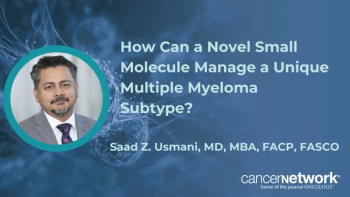
Biagio Ricciuti, MD, on Rationale for Analyzing Pembrolizumab Efficacy Relative to PD-L1 Expression in NSCLC
Biagio Ricciuti, MD, spoke about patients with non–small cell lung cancer with a very high PD-L1 tumor proportion score of 90% or more who were treated with first-line pembrolizumab monotherapy.
At the
Transcript:
Immunotherapies have changed the landscape of treatment for patients with NSCLC and very few trials [have been conducted recently]. We now use immunotherapies, either alone or in combination with chemotherapy, as first-line therapy for most patients with NSCLC. The disease lacks actionable drivers and targeted therapies are available.1 What we do not know is why a significant fraction of these patients did not respond to immunotherapies. With immunotherapy alone in patients with high PD-L1 expression, only 50% of patients respond to this treatment
We don’t have a lot of information and data on which patients respond to immunotherapy and who do not and whether there are pathological genomic features that may help us better understand patients. As part of this study in which we try to address this question, we focus on whether the given expression can help us find the subgroup of patients who respond to immunotherapy within this subset of patients with NSCLC and high PD-L1 expression.
We looked into this question in 2019 and we published a paper in Annals of Oncology in which we found that patients with PD-L1 expression of 90% or greater derived the [most] benefit from immunotherapy compared with those who had an expression of 50% to 89%.2 Until now, we didn’t have long-term outcome data on this patient population. What we did was look at this patient population and see whether patients with very high [PD-L1] expression can retain this benefit after 3 years. As part of this study, we also tried to perform some correlative analysis to determine whether this subset of patients with high PD-L1 expression at 90% or greater TPS had unique immunophenotypic features or generic features that may partially contribute to or explain their benefit from immunotherapy.
References
- Ricciuti B, Elkrief A, Alessi J, et al. Three-year outcomes and correlative analyses in patients with non–small cell lung cancer (NSCLC) and a very high PD-L1 tumor proportion score (TPS) ≥ 90% treated with first-line pembrolizumab. J Clin Oncol. 2022; 40(suppl 16):9043. doi:10.1200/JCO.2022.40.16_suppl.9043
- Aguilar EJ, Ricciuti B, Gainor JF, et al. Outcomes to first-line pembrolizumab in patients with non-small-cell lung cancer and very high PD-L1 expression. Ann Oncol. 2019;30(10):1653-1659. doi:10.1093/annonc/mdz288
Newsletter
Stay up to date on recent advances in the multidisciplinary approach to cancer.





































